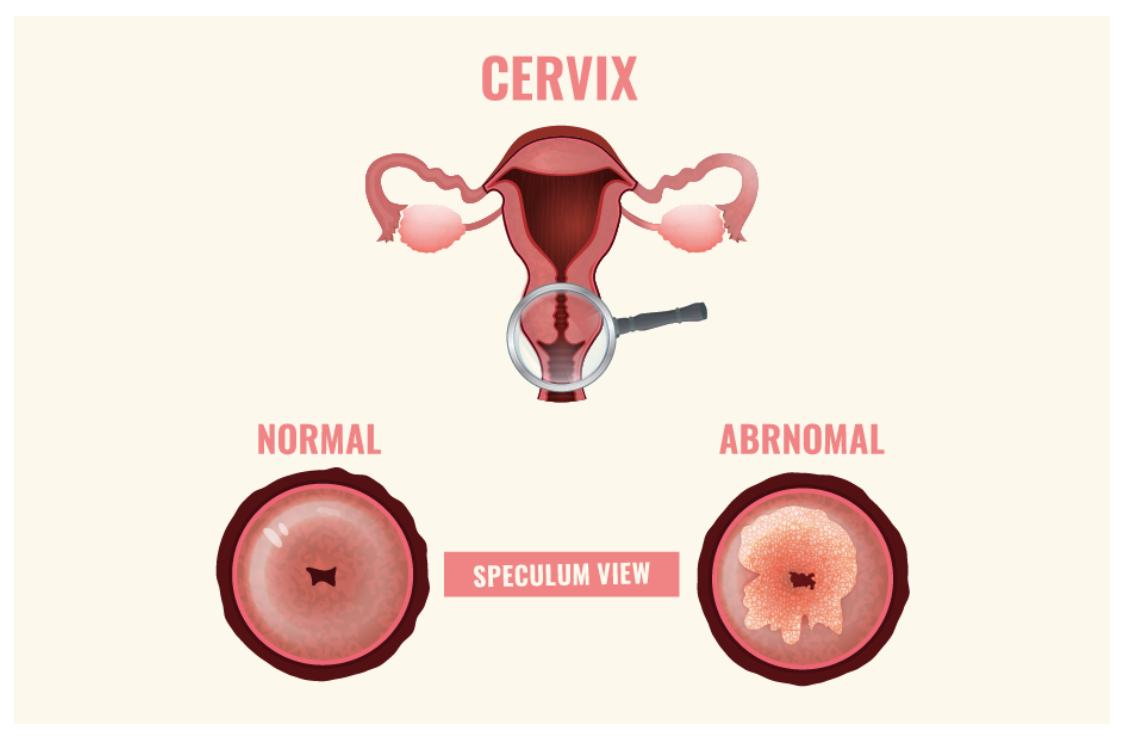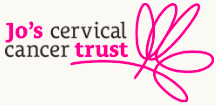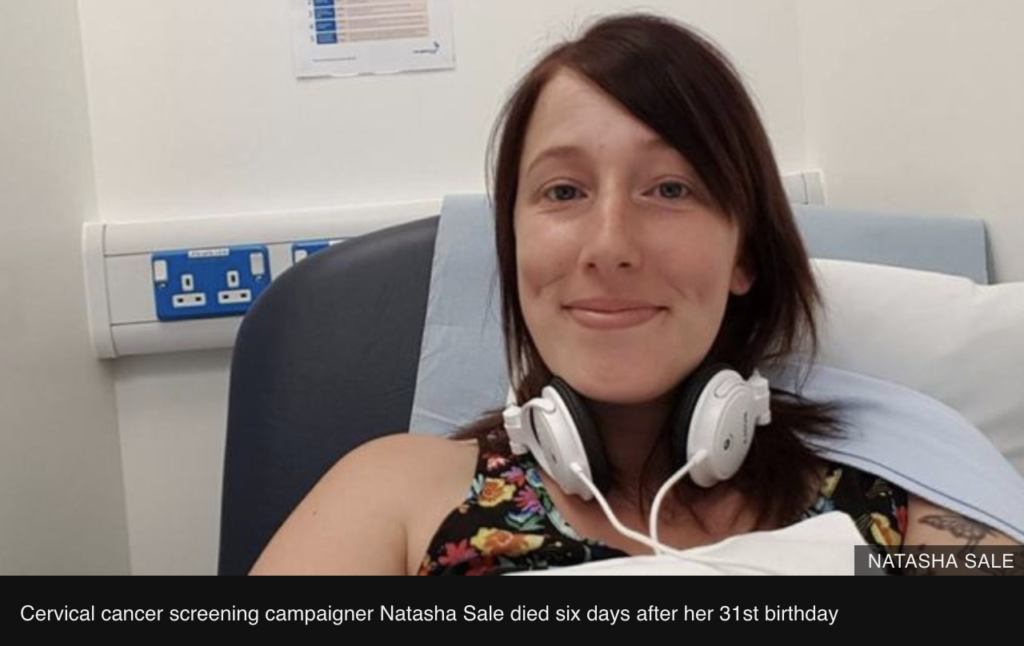Do you know how to prevent Cervical Cancer?
When you know how to prevent cervical cancer you can help save lives.
Cervical Cancer is preventable. With vaccinations now available and screenings preventing 75% of cervical cancers, now is the perfect time to raise awareness.
However, despite knowing how to prevent cervical cancer, screenings are at an all-time low with 1 in 4 women not going for their routine appointments. There’s also a current campaign to lower the age of screenings from 25 -18 years old, so there’s never been a better time to know your facts around cervical cancer prevention.
What is Cervical Cancer and what causes it?
Cervical cancer develops from abnormal cell changes in the cervix, which is the lower part or ‘neck’ of the womb.

99.7% of cervical cancer is caused by the human papilloma virus (HPV), which is very common, with 80% of sexually active adults being infected at some point in their lives. It often doesn’t present any symptoms, which is why screening is so important for cervical cancer prevention. For the majority of women with HPV, it will not result in cervical cancer, especially when early detection and treatment is available.
HPV and Cervical Cancer:
The National Health Service (NHS) says ‘Most women will get some type of HPV infection at some point in their lives. HPV is a group of over 100 different viruses spread through sexual activity. Some types of HPV don’t cause any noticeable symptoms and the infection will pass without treatment. However, at least 15 types of HPV are considered high-risk for cervical cancer. High-risk types of HPV are thought to stop the cells from working normally, which can eventually cause them to reproduce uncontrollably, leading to the growth of a cancerous tumour’.
Symptoms of Cervical Cancer:
Cervical cancer often has no symptoms in the early stages, which makes regular screenings extremely important for cervical cancer prevention, early detection, and treatment.
In most cases, the first noticeable symptom of cervical cancer is unusual bleeding:
- During and after sex
- Between periods
- After menopause

Abnormal bleeding doesn’t necessarily mean that you have cervical cancer, but it should be investigated by your GP as soon as possible. When it comes to preventing cervical cancer, knowing what to look out for and when to get professional advice can be life-saving.
Other symptoms may include pain during sex, unusual vaginal discharge, and lower back pain.
WHO and what can be done?
According to The World Health Organisation (WHO), ‘cervical cancer is the fourth most frequent cancer in women with an estimated 570,000 new cases in 2018 representing 6.6% of all female cancers.
The high mortality rate from cervical cancer globally could be reduced through a comprehensive approach that includes prevention, early diagnosis, effective screening and treatment programmes.’

The benefits of screening and early detection:
Regular cervical screening tests can show abnormal cell changes at an early stage and if necessary treatment can stop cancer developing. This means that with treatment, cervical cancer can be prevented.
Early diagnosis of cervical cancer and access to effective treatment can significantly improve the likelihood of survival. Cervical screening tests prevent 75% of cervical cancers in the UK. However, the number of people having screenings is at a 20-year low. According to Public Health England (PHE) ‘if all eligible women attended cervical screening regularly, 83% of cervical cancer could be prevented’.

How to Prevent Cervical Cancer?
- Attend regular cervical screenings
- Know the symptoms of cervical cancer and when to seek medical advice
- Encourage anyone aged 11-18 to take the HPV vaccination
- Take measures to prevent the spreading of HPV
- Know where to find support and further information

According to Jo’s Cervical Cancer Trust, ‘the most effective method of preventing cervical cancer is through regular cervical screening, which allows detection of any early changes to the cells of the cervix. These changes are fully treatable, but if undetected and untreated they can lead to cervical cancer in some women.
For younger women, the HPV vaccination can help prevent seven out of ten cases of cervical cancer (70%). This means that cervical cancer is largely preventable. If a woman does develop cervical cancer, survival and cure rates are high if the cancer is picked up early.

The Oxford Vaccine Group report that ‘in clinical trials, the vaccine was over 99% effective at preventing pre-cancer caused by HPV types 16 or 18 in young women. It is expected that vaccination will reduce the number of cases of the most common kind of cervical cancer by at least 70%.
Anyone who has had sexual contact has a risk of getting HPV, which is why taking measures to prevent the spread of HPV is important. Condoms can reduce the risk, along with protection of other sexually transmitted diseases. However, as HPV is transmitted through genital contact (not just intercourse), condoms do not provide 100% protection against HPV.
Know where to find support:
Knowing how to prevent cervical cancer will help save lives – not just potentially your own, but also within your family, friends, colleagues, and clients. There are so many excellent resources and expert support available, such as the ones linked above for cervical cancer prevention.
Cancer prevention and what can you do if you get a difficult diagnosis?
Marisa Peer, founder of Rapid Transformational Therapy™ (RTT), had cancer and believes that the power of the mind could hold the key to helping defeat it. She now teaches others how to use the techniques she has developed over thirty years, to empower people to overcome all kinds of physical and emotional challenges.
In one of the RTT training Masterclasses for certified practitioners of Rapid Transformational Therapy, Marisa shared 5 ways to empower people to encourage their mind and body to work together to support their cancer treatment:

Using Command Cell Therapy and Healing Vortex, Rapid Transformational Therapy works with the subconscious to deliver instructions to your body to help restore optimum health and wellbeing. It can also be used to help enhance the body’s natural healing capabilities, develop phenomenal coping skills and thrive in spite of life’s challenges.
How to get involved with Cervical Cancer Prevention Week:

Jo’s Cervical Cancer Trust has lots of fantastic resources and ways to get involved. They have also created a #smearforsmear campaign to raise awareness of how to prevent cervical cancer.
They say that ‘the number of people going for smear tests is lower than ever. Together we can change this! We want everyone to know what a smear test is for, why they’re important and ways to make them better.’
Share selfies to save lives:
You can join in by sharing a selfie with your lipstick #SmearForSmear and a word of encouragement or support. The idea is to raise awareness of how to prevent cervical cancer and how important cervical screening is.
You can alsoSign the petition to lower the age of screeningfrom 25 to 18.
In dedication to Natasha Sale, who sadly lost her life to Cervical Cancer in December 2018 aged just 31. Natasha wanted to raise awareness of the importance of screening at a young age. Natasha’s army of supporters continues her campaign to “lose the fear and get the smear” and reduce the age of cervical screenings from 25 to 18, which will get debated in parliament in 2019.

“By reducing the age of smear tests and cervical screenings today we can save lives, we can tackle cell changes early and prevent cervical cancer. If I can do anything with my life I want to make this change happen.”
– Natasha Sale.
Thank you for reading this article and supporting Cervical Cancer Prevention Week. Raising awareness of cervical cancer prevention will hopefully help save lives so that everyone can know how to prevent cervical cancer.


